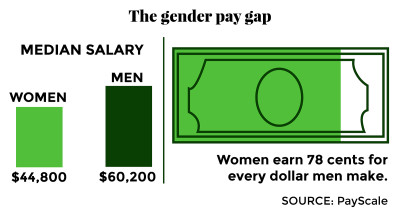
Women earn 2.7 percent less in wages compared to men working in similar jobs, a Thursday report by PayScale found.
The report differentiates between comparing all men and women and instead looks at how they work in similar jobs. Overall, women make 78 cents on the dollar for every dollar men make, according to a national statistic from the U.S. Bureau of Labor Statistics.
PayScale took into account main factors that affect how the gender pay gap is perceived, including job type, job level, compensable factors, marriage and family and unconscious bias. Salaries for males have remained higher than female salaries across the board, regardless of the varying methods of data analysis, such as age, location and leadership status, according to the report.
“One surprising and significant takeaway is that the more often a woman tells us that she prioritizes home or family obligations over work, the larger the controlled gender pay gap becomes, even when compared to men with similar characteristics who say they prioritize home and family over work with the same frequency,” said Katie Bardaro, vice president of data analytics and lead economist at PayScale, in a Thursday press release.
Carrie Preston, a professor of women’s, gender and sexuality studies in Boston University’s College of Arts and Sciences, said the pay gap represents significant hardships on women as well as prejudice in hiring and salaries.
“Moreover, that wage gap doesn’t account for all the ways that our culture discourages women from seeking highly paid careers and channels them into the so-called caring professions, and then devalues that crucial care work,” Preston said.
Men’s salaries typically plateau at $75,000 at 50 to 55 years old while women’s salaries typically plateau at $49,000 at 35 to 40 years old, the report found. A relatively common job for men is an engineer, which earns a median salary of $74,800, and a common job for women is social work, which earns a median salary of $44,000, according to the report.
Preston said a 2.2 percent gap in Massachusetts is important, far beyond establishing a difference in salaries.
“I would like to believe that Massachusetts is much better than the rest of the nation, but I have come to realize that gender bias is prevalent everywhere,” Preston said.
The study collected data from 1.4 million full-time employees through a survey that took place from July 2013 to July 2015.
A diverse workforce, the report stated, can support gender equality and lead to greater profits.
“More and more companies are taking steps to address gender inequities in the workplace — from hiring to advancement to pay,” said Lydia Frank, senior editorial director of PayScale, in the release. “And, the most successful organizations understand that using market data to drive pay decisions and being more transparent with your employees about your pay practices keeps everyone accountable and builds a healthier, more trusting work culture.”
Preston said despite steps toward equality between the genders, there is more to be done.
“The feminist movement has helped women make important gains in terms of education and job opportunities, and I think it is easy to see those gains and feel complacent or even to feel that workplace bias has ended,” Preston said. “However, the wage gap is deeply entrenched and has not significantly improved over the years. There is much more work to do.”
Martin Harrison, 61, of Back Bay, said while the situation is unfortunate, he is not surprised that there is pay inequity between the genders.
“I’ve heard that my entire life that women get paid less than men for the same jobs,” he said. “ … There is a lot of reasons for pay differentials, and it is not necessarily based upon gender discrimination. If given the opportunity, I would pay the best candidate and I think most people would.”
Jenna Poggi, 24, of Back Bay, said she was surprised to hear about women receiving less pay in Massachusetts.
“I have always perceived Massachusetts as very liberal and very equal, especially in comparison to the rest of the country,” she said. “The fact that women are still getting paid less is the opposite of what I would expect.”






















































































































